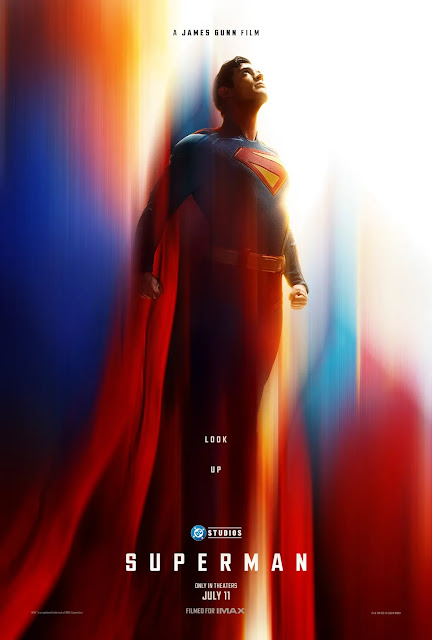In the words with which New York Times critic Janet Maslin kicked off her 1982 review of Star Trek II: The Wrath of Khan, "Well that's more like it."
James Gunn's new Superman film is just the cinematic rebirth this character and his mythos needed after decades of failed reboots and reinventions, tacked-on latent sequels, and joyless, unpleasant "realistic" takes. I've said for a long time that Superman is a simple character, but simultaneously a very easy one to screw up. He needs to be a paragon of virtue and a symbol of hope, but also needs real human frailty and uncertainty to make him relatable to us screwed up mortals. He needs to be nigh invincible but still vulnerable, both physically and especially emotionally. Gunn and his collaborators have threaded this needle so deftly I found myself choking up at numerous points during this film. Turns out there was a very simple but vital ingredient missing from Zack Snyder's dour Superman films: pathos.
Rather than retelling the same tired origin story we've already sat through so many times, Superman dumps us right in the middle of the action, quickly filling us in with a series of prologue titles. Thirty years ago the son of Krypton was sent to Earth, three years ago he went public with his super-identity, three weeks ago he prevented a war in Eastern Europe, and three hours ago he was bested by another meta-human called The Boravian Hammer. We pick up the action as he crash-lands, severely wounded, near his Fortress of Solitude. His dimwitted but loyal dog Krypto helps him back to safety, and his Fortress robots heal him with concentrated solar rays.
We quickly learn that super-villain Lex Luthor (a hate-filled, calculating Nicholas Hoult) and his corporation are behind the Boravian Hammer, and Luthor is manipulating US government officials into giving him the authority to destroy the indestructible Kryptonian, lest Superman decide to use his powers for evil instead of good. Some of these themes may feel familiar as they were explored in Snyder's Batman v Superman, but unlike in that film this Luthor's motivations and methods are made very clear.
Without getting too much into plot details, Superman (an absolutely splendid David Corenswet, who at times reminded me of a young Brendan Fraser) and Lois Lane (a perfectly cast Rachel Brosnahan) are already in a romantic relationship but have kept it to themselves, and in front of their Daily Planet colleagues they keep up the charade of Lois not knowing who Clark Kent really is. Corenswet and Brosnahan only have a few key dialogue scenes together but their chemistry is undeniable, particularly in a scene where Clark agrees to be interviewed by Lois as Superman.
Supes also has some metahuman help this time around in the form of The Justice Gang (name not finalized): Green Lantern Corps member Guy Gardner (a cocksure, sarcastic Nathan Fillion), Hawk Girl (Isabela Merced), and most significantly Mister Terrific (Edi Gathegi in a hugely charismatic performance). Their alliance with Supes is an uneasy one and they find themselves torn between doing what's right and acting in self-preservation. Also for the first time in a Superman film Jimmy Olsen actually has something meaningful to do, helping Lois uncover LexCorp's sinister activities.
As Luthor's master plan unfolds the film takes us to some very dark, close-to-home places, exploring themes of authoritarianism, corporate opportunism, social media manipulation, character assassination, real vs. bogus journalism, climate destruction, and human rights violation. But unlike in the Snyderverse, this Superman maintains his belief in good. Even in the face of appalling crimes against humanity, this Kal-El never loses his. And that makes all the difference. James Gunn also succeeds where Zack Snyder failed in exploring how our current world would react if a superpowered alien lived in it. Would Kal-El be our savior or would he be seen as an existential threat? Would his trusting nature be easily exploited by someone like Lex Luthor?
Gunn has described this film as being less about politics and more about "basic human kindness, which is something we have lost." In these times of division, chaos and intolerance, we need an ideal to strive toward more than ever. In his RogerEbert.com review, film critic Richard Roeper poses the question, "Is this film really necessary?" And my answer is, absolutely.
There are things I could nitpick about Superman - some of the dialogue is a little on the nose (particularly a third-act speech Kal delivers to Luthor), some of the action sequences are a little repetitious (though not nearly to the extremes found in Man of Steel), and once again all of Metropolis is ultimately threatened - but the film's heart is so squarely in the right place, appealing so earnestly to our better nature and capturing so beautifully what I love about the character of Superman, that it's easy to forgive the aforementioned imperfections and tropes. Superman is, as Ebert himself used to say, "a great entertainment," with a genuine desire to remind us of our fundamental humanity.
I give Superman **** out of ****.


No comments:
Post a Comment